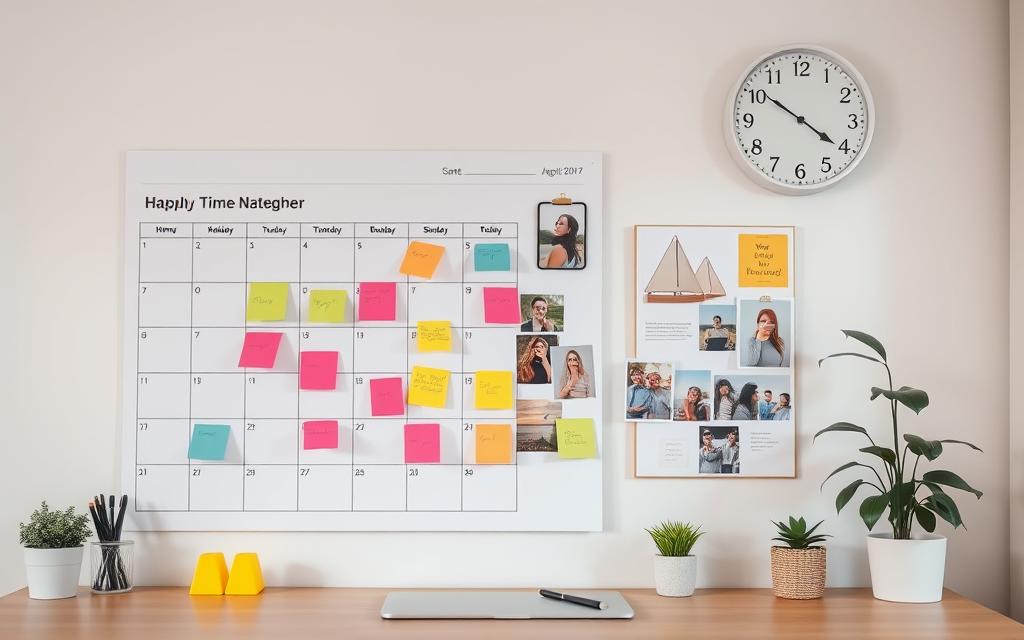Reflecting on my journey, I see how self-confidence has changed my life. It’s a strong force that shapes how we see the world and interact with it. It’s key for facing new challenges, speaking up, or just getting through daily life.
In today’s fast world, building and keeping self-confidence is crucial. Effective self-confidence building strategies are essential for growth. We’ll look at the science of confidence, the psychology of self-esteem, and the power of self-compassion.
We’ll learn to break free from negative thoughts, grow our minds, and improve our presence. Understanding confident communication and daily habits will guide us to lasting confidence.
Are you ready to [overcome self-doubt], boost your self-esteem, and be your true self? Let’s explore the secrets to Effective Self Confidence Building Strategies Today.
Understanding the Psychology of Self-Confidence
Self-confidence and self-esteem are similar but not the same. Self-esteem is about feeling worthy of respect. Self-confidence is about believing in oneself. Both can be improved with self-esteem exercises and strategies.
The Science Behind Confidence Building
Building confidence involves understanding how we think, feel, and act. Research shows confidence is key for our health and happiness. A 2018 study found envy can lower our self-esteem.
Impact on Mental Well-being
Confidence greatly affects our mental health. It influences our mood, decisions, and happiness. Being around positive people can boost our self-esteem and confidence.
Healthy eating and exercise also help. They improve how we see ourselves and feel overall.
Self-compassion is linked to confidence. Being kind to ourselves helps us handle tough emotions better. Changing negative thoughts to positive ones can also help. This boosts our confidence.
Breaking Free from Negative Self-Talk Patterns
Negative self-talk can hold you back from feeling confident. It’s important to spot these negative thoughts and replace them with positive ones. Studies show that positive self-talk boosts confidence, improves performance, and helps manage stress.
Try changing negative thoughts into positive ones. Instead of saying, “I can’t handle this,” say, “I can do this.” This approach leads to more optimism, resilience, and better decision-making.
- Identify common negative self-talk phrases, such as “I’m not good enough” or “I can’t do anything right.”
- Challenge these distorted thoughts by replacing them with more realistic, positive self-statements.
- Seek professional help if negative self-talk persists and significantly impacts your emotional well-being or daily functioning.
Overcoming negative thoughts and adopting positive self-talk is a journey. But the rewards are worth it. By using these strategies, you can reach your full potential and gain the confidence to achieve your dreams.

The Power of Self-Compassion in Building Inner Strength
Building self-confidence is key, and self-compassion plays a big role. Self-compassion means treating yourself with kindness, even when you. It helps you feel more emotionally flexible and connect better with others.
Practicing Self-Acceptance
Self-acceptance is at the core of self-confidence. It’s about accepting your strengths and weaknesses without being too hard on yourself. This way, you can fight off self-doubt and feel more worthy.
Overcoming Self-Doubt
Self-doubt can hold you back from feeling confident. Self-compassion helps you change negative thoughts into positive ones. This makes it easier to handle tough times.
Developing Emotional Resilience
Being resilient is important for self-confidence. Self-compassion boosts emotional resilience, helping you stay positive even when things get tough. It helps you manage your feelings better, leading to better mental health and inner strength.
Self-compassion is incredibly powerful for building inner strength. By accepting yourself, overcoming self-doubt, and being resilient, you can reach your full potential. This boosts your self-confidence and overall well-being.
Essential Self Confidence Building Strategies
Building self-confidence is a journey that needs effort and practice. One key strategy is to focus on grooming and dressing in a way that boosts your mood. It’s also important to think positively and avoid negative self-talk.
Getting to know yourself better is crucial. Acting in line with your values and being kind to others can boost your self-worth. Preparation, speaking clearly, and living by your principles also help increase confidence.
- Boost your self-image by practicing good grooming and dressing well
- Eliminate negative thoughts and embrace a positive mindset
- Discover and embrace your unique strengths and talents
- Act in a way that reflects your principles and values
- Speak with clarity and confidence to convey your message effectively

By using these self-confidence building strategies every day, you can reach your full potential. Remember, self-confidence is a skill that can be developed with time and effort.
Transforming Your Physical Presence and Body Language
Your body language and how you present yourself greatly affect your self-confidence. By using powerful, assertive body language, you can show your true self. This helps you develop the skills needed to succeed.
Power Postures for Confidence
Standing tall and keeping good posture can make you feel more confident. Studies show that positive body language, like open postures and smiling, can lead to better interactions. It also makes you feel more powerful and self-assured.
Try using “power poses” like the “Superman pose” before big events. This can increase your testosterone and lower stress hormones. You’ll feel more confident and in charge.
Vocal Techniques for Authority
The way you speak can show confidence and authority. Speak slowly, clearly, and with purpose to show self-assurance. Keep your voice steady and avoid saying “um” or “uh.” These tips can help you get attention and respect, even in tough situations.
Non-verbal Communication Skills
- Eye contact: Direct eye contact shows confidence, engagement, and honesty.
- Gestures: Using confident and assertive gestures can make you seem more impressive and boost your self-confidence.
- Mirroring: Mirroring others’ body language can help you connect and build rapport. It also boosts your confidence.
Remember, non-verbal communication is a big part of how we connect with others. Working on these skills can greatly improve how you present yourself and how others react to you.
Creating a Confident Mindset Through Daily Habits
Building confidence is a journey, not a quick fix. By adding positive daily habits, you can tap into positive self-talk techniques and inner strength. Begin your day with a routine that boosts your confidence and self-assurance.
Gratitude is powerful. Spend a few minutes each day thinking about what you’re thankful for. This simple act can change your mindset, making you feel more worthy.
- Set and achieve small, manageable goals to experience the thrill of accomplishment. These mini-victories will reinforce your belief in your abilities.
- Engage in positive self-talk. Replace self-doubt with affirmations that affirm your strengths and potential.
Take care of your body and mind. Regular exercise, meditation, and enough sleep boost your confidence. Feeling good physically and mentally makes your self-assurance shine.
Remember, confidence is a journey, not a destination. By making these habits part of your daily life, you’ll build a mindset that empowers you. You’ll be ready to face challenges and seize new opportunities with confidence.
The Role of Self-Care in Boosting Confidence
Self-care is key to building and keeping self-confidence. It involves taking care of your body, mind, and emotions. This helps you feel more assured and resilient.
Physical Wellness Practices
Regular exercise, a healthy diet, and enough sleep boost self-esteem and body image. These are important for confidence. Taking care of your body makes you feel more worthy and accepted.
Mental Health Maintenance
Managing stress and anxiety is part of self-care. Techniques like meditation and mindfulness help. Getting professional help when needed is also important. This builds mental strength and self-assurance.
Emotional Balance Techniques
Journaling, deep breathing, and hobbies can improve your mood and balance. These activities increase self-awareness and self-compassion. They help build stronger confidence.
Self-care is a journey to a healthier, more confident you. By adding self-esteem exercises and resilience-building strategies to your life, you can reach your full potential. You’ll thrive with more self-assurance.
Developing Professional Confidence in the Workplace
Building professional confidence is key for career success. Studies show that self-confident people take on new challenges and goals, even when it’s tough. This confidence boosts motivation, ambition, and performance, leading to career growth and better work relationships.
Boosting your confidence at work starts with learning new skills and knowledge. Investing in professional development can make you more confident and perform better. Learning new things helps you see your strengths and motivates you to learn more.
Being assertive, like sharing your opinions and setting boundaries, is vital for growth and confidence. Overcoming self-doubt and facing challenges can also boost your confidence.
- Ask for feedback from supervisors or peers to find areas to improve and celebrate your wins.
- Try public speaking or take on tough projects to step out of your comfort zone and build confidence.
- Watch and learn from confident colleagues to build your own self-assurance.
Remember, building professional confidence is a journey. Focus on your strengths, learn from mistakes, and stop negative self-talk. This mindset will drive your career forward.

Building Social Confidence and Relationship Skills
Social confidence is key for both personal and work relationships. It lets you handle social situations well, have deep talks, and make real connections. Learning to be assertive and being true to yourself can boost your social confidence. This helps you build better relationships.
Networking with Confidence
Good networking mixes prep, listening, and follow-up. Before a networking event, research who’s going and think about what to talk about. At the event, listen well, ask smart questions, and share about yourself. Then, reach out to new contacts to grow your connections.
Social Interaction Strategies
Getting good at socializing can really help your confidence. Start with small chats by finding common ground or talking about news. Show you care by asking questions and listening well. Be yourself, with your own personality and experiences, to be interesting and real.
Social confidence grows with practice. It’s not about being the center of attention. It’s about feeling at ease and confident in yourself. By working on assertiveness and being true, you’ll get better at socializing and making connections.
Overcoming Fear and Embracing Challenges
Building self-confidence means fighting negative thoughts and learning to face challenges. Fear can stop us from growing and succeeding. But, by facing our fears and taking on challenges, we can reach our full potential.
Seeing challenges as chances to grow is key. When we see obstacles as ways to prove ourselves, we start to build a resilient mindset. This mindset lets us act despite fear, building confidence and trust in ourselves.
Visualization is a strong tool in this journey. Imagining ourselves overcoming tough situations helps us feel more confident and determined. Also, facing our fears slowly, with kindness to ourselves, helps us conquer them.
It’s important to celebrate our small wins. Recognizing our achievements boosts our belief in ourselves. This keeps us motivated to keep going.

The path to overcoming fear and embracing challenges is life-changing. By being resilient, kind to ourselves, and taking steps towards our goals, we can conquer negative thoughts. This opens the door to a more confident and fulfilling life.
The Impact of Personal Appearance on Self-Confidence
How we look affects our self-confidence a lot. Our grooming and clothes can change how we feel about ourselves. If we were teased about our looks when we were young, it can make us doubt ourselves later.
But, it’s important to be true to ourselves and love our bodies. Studies say that feeling good about ourselves helps us be more confident. We should focus on our strengths, not compare to others.
Changing our mindset can help us see ourselves in a better light. Feeling good about how we look can make us feel more confident and self-assured.
What we wear and how we groom ourselves matters a lot. Looking good before a big event can make us feel more ready and confident. Different cultures have their own ideas about what’s right to wear and how to look.
In the end, how we look affects our confidence in many ways. By being true to ourselves and taking care of our well-being, we can feel more confident and empowered.
- Understand the psychology behind the impact of personal appearance on self-confidence.
- Embrace your unique style and body positivity to boost self-worth.
- Address negative thought patterns and seek positive experiences to cultivate a healthier self-image.
- Recognize the importance of grooming habits and clothing choices in shaping self-perception and confidence.
- Be mindful of cultural differences in personal appearance norms and how they can influence self-confidence.
Setting and Achieving Confidence-Building Goals
Building self-confidence is a journey. Setting clear, achievable goals is a powerful way to make steady progress. Use the SMART (Specific, Measurable, Achievable, Relevant, Time-bound) goal-setting framework. This will help you create a roadmap for developing your self-confidence and overcome self-doubt.
SMART Goal Setting
The SMART approach to goal setting makes sure your objectives are well-defined and realistic. When crafting your confidence-building goals, make sure they are:
- Specific: Clearly define what you want to achieve, such as “Speak up confidently in team meetings” or “Initiate a conversation with a new person at a social event.”
- Measurable: Determine how you will track your progress, such as the number of times you speak up or the number of new connections you make.
- Achievable: Set goals that stretch you but are still within your reach, based on your current skills and resources.
- Relevant: Ensure your goals align with your broader self-confidence building strategies and overall personal or professional aspirations.
- Time-bound: Establish a realistic timeline for achieving your goals, such as “Speak up confidently in team meetings at least twice per week over the next three months.”
Progress Tracking Methods
Regularly tracking your progress is essential for maintaining motivation and seeing tangible evidence of your growth. Consider using a variety of methods, such as:
- Journaling: Reflect on your experiences, successes, and challenges in a personal journal.
- Goal-tracking apps: Utilize digital tools to set reminders, log your progress, and celebrate milestones.
- Visual progress charts: Create a visual representation of your goals and track your advancement over time.
By setting SMART goals and implementing effective progress tracking methods, you’ll be well on your way to building the self-confidence you need. This will help you overcome any obstacle and achieve your dreams.

Maintaining Long-Term Confidence Growth
Building self-confidence is a journey, not a single goal. To keep growing in confidence, it’s key to use strategies that build resilience. Also, always work on boosting your self-worth.
One important step is to regularly check and change your goals. Celebrate your wins and then aim for even bigger goals. This keeps you motivated and focused on growing.
Another great way is to keep learning. Attend workshops, take classes, or study on your own. Learning new things boosts your confidence and makes you feel more capable.
Being around people who believe in you is also crucial. Find mentors or friends who support and give you honest feedback. Their help can keep your confidence strong, even when things get tough.
Lastly, having a growth mindset and being kind to yourself are vital. See challenges as chances to learn and grow, not threats. When you face setbacks, be gentle with yourself, not too hard.
By using these strategies every day, you can build lasting confidence. This confidence will help you face new challenges, celebrate your wins, and keep growing as a person.
Conclusion
Building self-confidence is a lifelong journey. It needs dedication, self-awareness, and consistent practice. By using self confidence building strategies, you can boost your self-esteem and self-worth. True confidence is about trusting yourself to handle life’s challenges and opportunities.
This article has covered the psychology and science of self-confidence. We’ve looked at practical strategies to build a stronger, more positive mindset. These include self-compassion, controlling negative self-talk, and using body language and daily routines.
The path to greater self-confidence is unique for everyone. By trying different methods and staying committed to self-improvement, you can reach your goals. Remember, the journey may have ups and downs, but with persistence and belief in yourself, you can overcome any obstacle.
